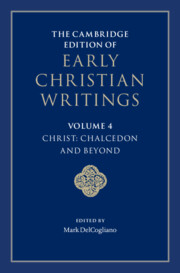Book contents
- The Cambridge Edition of Early Christian Writings
- The Cambridge Edition of Early Christian Writings
- The Cambridge Edition of Early Christian Writings
- Copyright page
- Contents
- Notes on Contributors
- Acknowledgments
- Note on the Texts and Translations
- Abbreviations
- Series Introduction
- Introduction
- Part I The Council of Chalcedon and Its Reception
- 1 Acts of the Home Synod at Constantinople (November 448):
- 2 Eutyches, Letter to Leo of Rome
- 3 Leo of Rome, Tome to Flavian of Constantinople
- 4 Acts of the Council of Chalcedon (October 451):
- 5 Leo of Rome, The Second Tome (Letter to Emperor Leo)
- 6 Timothy Aelurus, Petition to Emperor Leo
- 7 Timothy Aelurus, Against the Council of Chalcedon
- 8 Timothy Aelurus, Letter to Claudianus
- 9 Emperor Zeno, The Henotikon
- 10 Pseudo-Dionysius the Areopagite, Fourth Letter
- 11 Narsai, Metrical Homily on “the Word became Flesh” (John 1:14)
- 12 Narsai, Selections from the Metrical Homilies on the Nativity and on the Epiphany
- 13 Philoxenos of Mabbug, Letter to the Monks of Senoun (Selections)
- 14 Jacob of Serugh, Metrical Homilies on the Name “Emmanuel” and on How the Lord is Known in Scripture as Food and Drink
- 15 Jacob of Serugh, Metrical Homily on the Council of Chalcedon
- 16 Jacob of Serugh, Letter 14
- 17 Simeon of Beth Arsham, Letter on Bar Ṣawmā and the Heresy of the Nestorians
- 18 Emperor Justinian, Edict on the Orthodox Faith (Selection)
- 19 Acts of the Second Council of Constantinople (May–June 553):
- Part II Christological Perspectives after Constantinople II
- Suggestions for Further Reading
- Scriptural Index
11 - Narsai, Metrical Homily on “the Word became Flesh” (John 1:14)
from Part I - The Council of Chalcedon and Its Reception
Published online by Cambridge University Press: 11 February 2022
- The Cambridge Edition of Early Christian Writings
- The Cambridge Edition of Early Christian Writings
- The Cambridge Edition of Early Christian Writings
- Copyright page
- Contents
- Notes on Contributors
- Acknowledgments
- Note on the Texts and Translations
- Abbreviations
- Series Introduction
- Introduction
- Part I The Council of Chalcedon and Its Reception
- 1 Acts of the Home Synod at Constantinople (November 448):
- 2 Eutyches, Letter to Leo of Rome
- 3 Leo of Rome, Tome to Flavian of Constantinople
- 4 Acts of the Council of Chalcedon (October 451):
- 5 Leo of Rome, The Second Tome (Letter to Emperor Leo)
- 6 Timothy Aelurus, Petition to Emperor Leo
- 7 Timothy Aelurus, Against the Council of Chalcedon
- 8 Timothy Aelurus, Letter to Claudianus
- 9 Emperor Zeno, The Henotikon
- 10 Pseudo-Dionysius the Areopagite, Fourth Letter
- 11 Narsai, Metrical Homily on “the Word became Flesh” (John 1:14)
- 12 Narsai, Selections from the Metrical Homilies on the Nativity and on the Epiphany
- 13 Philoxenos of Mabbug, Letter to the Monks of Senoun (Selections)
- 14 Jacob of Serugh, Metrical Homilies on the Name “Emmanuel” and on How the Lord is Known in Scripture as Food and Drink
- 15 Jacob of Serugh, Metrical Homily on the Council of Chalcedon
- 16 Jacob of Serugh, Letter 14
- 17 Simeon of Beth Arsham, Letter on Bar Ṣawmā and the Heresy of the Nestorians
- 18 Emperor Justinian, Edict on the Orthodox Faith (Selection)
- 19 Acts of the Second Council of Constantinople (May–June 553):
- Part II Christological Perspectives after Constantinople II
- Suggestions for Further Reading
- Scriptural Index
Summary
The long-lived Narsai – he died a nonagenarian ca. 500 – was a poet and teacher at both the School of Edessa and the School of Nisibis. His thought and works were foundational for the development of theology in the Church of the East. Steeped in Syriac literary traditions, principally the writings of Ephrem the Syrian, Narsai was also among the first generation of Syriac authors to be shaped by the theology and interpretative strategies of Theodore of Mopsuestia (d. 428) through translations of the Greek into Syriac. The work of translating Theodore’s works was centered at the School of Edessa and coincided with the fateful events around the Council of Chalcedon and the resulting strife surrounding the Christological debates. Narsai’s poetry displays his dynamic reception of both Ephrem and Theodore’s theological and interpretative programs. Working in the aftermath of Council of Ephesus, Narsai became embroiled in the Christological controversies, often reflected in his poetry. At an uncertain date prior to the closure of the School of Edessa in 489, Narsai and his colleagues departed from Edessa, leading to the formation of the School of Nisibis within the Persian Empire.
- Type
- Chapter
- Information
- The Cambridge Edition of Early Christian Writings , pp. 194 - 213Publisher: Cambridge University PressPrint publication year: 2022



